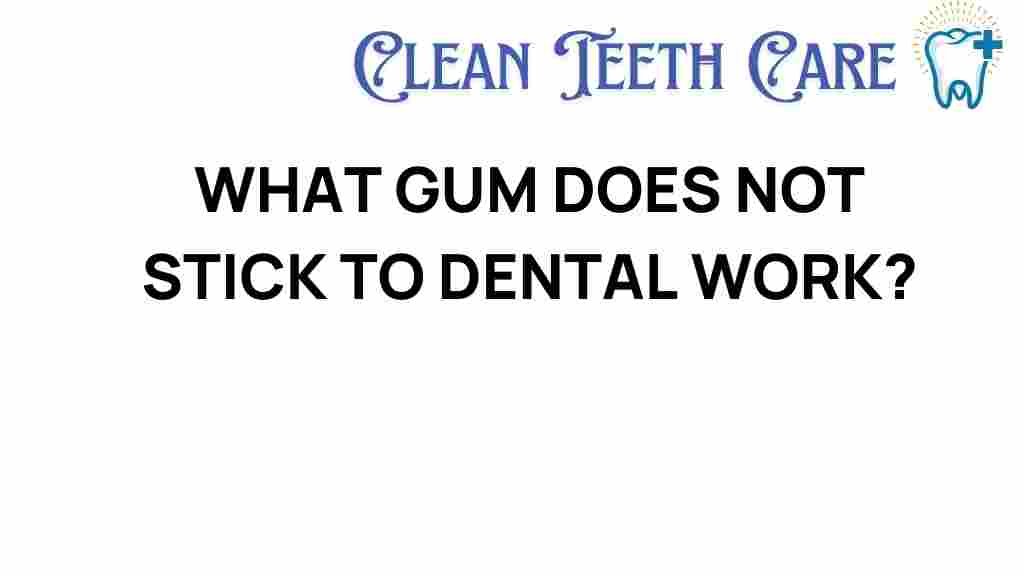

The Surprising Truth: What Gum Won’t Stick to Your Dental Work?
When it comes to maintaining oral hygiene, many people have questions about the compatibility of chewing gum with their dental work. For those who have undergone restorative dentistry procedures such as dental implants, crowns, or bridges, the concern about whether gum will stick to their dental work is valid. In this article, we will explore the relationship between gum and various types of dental work, offer patient tips, and provide essential dental advice to ensure you maintain optimal dental care.
Understanding Dental Work and Gum
Before diving into the specifics, it’s crucial to understand what types of dental work exist and how they interact with chewing gum. Dental work encompasses a variety of procedures designed to restore or improve dental health. Here are some common types of dental work:
- Dental Implants: Artificial tooth roots placed into the jawbone to support replacement teeth.
- Crowns: Caps placed over damaged teeth to restore their shape, size, and function.
- Bridges: Appliances used to replace one or more missing teeth by anchoring to adjacent teeth.
- Fillings: Materials used to fill cavities and restore the function of decayed teeth.
Now, let’s address the central question: Does chewing gum stick to these dental restorations?
What Gum Won’t Stick to Your Dental Work?
The good news is that not all gum will adhere to your dental work. In fact, many modern dental care materials are designed to withstand the forces of chewing without any adverse effects. However, the type of gum you choose can make a significant difference.
Types of Gum
There are two primary types of chewing gum:
- Sugar-Free Gum: Typically made with artificial sweeteners and less sticky ingredients.
- Regular Gum: Contains sugar and often has a stickier texture.
When considering what gum won’t stick to your dental work, opt for sugar-free gum. Here’s why:
- Less Stickiness: Sugar-free gums are generally less sticky than their sugary counterparts, making them less likely to adhere to dental work.
- Dental Benefits: Chewing sugar-free gum can stimulate saliva production, which helps neutralize acids in the mouth and can aid in maintaining oral hygiene.
- Lower Risk of Damage: The materials used in sugar-free gum are less likely to cause wear on dental work compared to regular gum.
Chewing Gum and Restorative Dentistry
When it comes to restorative dentistry, the type of material used for your dental work is essential. Here’s how different types of dental work react to chewing gum:
- Dental Implants: Implants are designed to be sturdy and can typically withstand chewing gum without any issues. However, it’s advisable to avoid excessive chewing force.
- Crowns: Crowns made from porcelain or ceramic are durable and should not be affected by chewing sugar-free gum.
- Bridges: Similar to crowns, bridges are generally safe with sugar-free gum. However, be cautious with the chewing force.
- Fillings: Modern fillings are also resilient, but it’s essential to avoid sticky or hard candies that can dislodge them.
Patient Tips for Chewing Gum
Here are some helpful patient tips to ensure you enjoy chewing gum without risking your dental work:
- Choose Wisely: Always opt for sugar-free gum to minimize the risk of damage to your dental work.
- Moderation is Key: Chew gum in moderation. Excessive chewing can strain dental work.
- Be Mindful of Flavor: Some flavors can be more acidic, potentially affecting your dental health if consumed excessively.
- Consult Your Dentist: Always discuss with your dentist about your specific dental work and if chewing gum is appropriate for you.
Common Concerns and Troubleshooting Tips
As with any aspect of dental care, patients may have concerns about chewing gum and its effects on their dental work. Here are some common concerns and troubleshooting tips:
- Concern: My dental work feels loose after chewing gum.
- Tip: If you feel any looseness, avoid chewing gum and contact your dentist immediately.
- Concern: I have a bad taste in my mouth after chewing gum.
- Tip: Switch to a different flavor of sugar-free gum or consult your dentist if the issue persists.
- Concern: Is it safe to chew gum with braces?
- Tip: Generally, it’s better to avoid gum with braces, as it can get stuck. Always follow your orthodontist’s advice.
Conclusion
In conclusion, the surprising truth about chewing gum and dental work is that sugar-free gum is generally safe for most types of dental restorations, including dental implants, crowns, bridges, and fillings. By choosing the right type of gum and following the dental advice provided, you can enjoy the benefits of chewing gum while maintaining your oral hygiene.
Remember, if you have any concerns about your specific situation or dental work, it’s always best to consult with your dentist for personalized advice. For more information on maintaining excellent dental care, check out this helpful resource.
Keep smiling, and happy chewing!
This article is in the category Hygiene and created by CleanTeethCare Team
Recent Posts
Do Back Braces Really Alleviate Lower Back Pain? The Surprising Truth
Discover if back braces truly help lower back pain and how they can impact your…
Unveiling the Mystery: The Role of Rubber Bands in Braces
Discover how rubber bands enhance braces effectiveness and lead to a healthier smile.
The Curious Case of Wisdom Teeth: Why Do They Have That Name?
Discover why wisdom teeth are named as they are and what their role is in…
Unveiling the Mystery: Are Teeth Sensitive After Braces Come Off?
Discover if teeth sensitivity occurs after braces removal and how to manage it effectively.
Unveiling the Secrets: What Healthplex Dental Coverage Really Entails
Discover what Healthplex dental coverage includes and how it can enhance your oral health and…
Is Dental Care Considered Medical? Unraveling the Connection
Is dental care considered medical? Explore the intriguing connection between oral health and medical treatment…